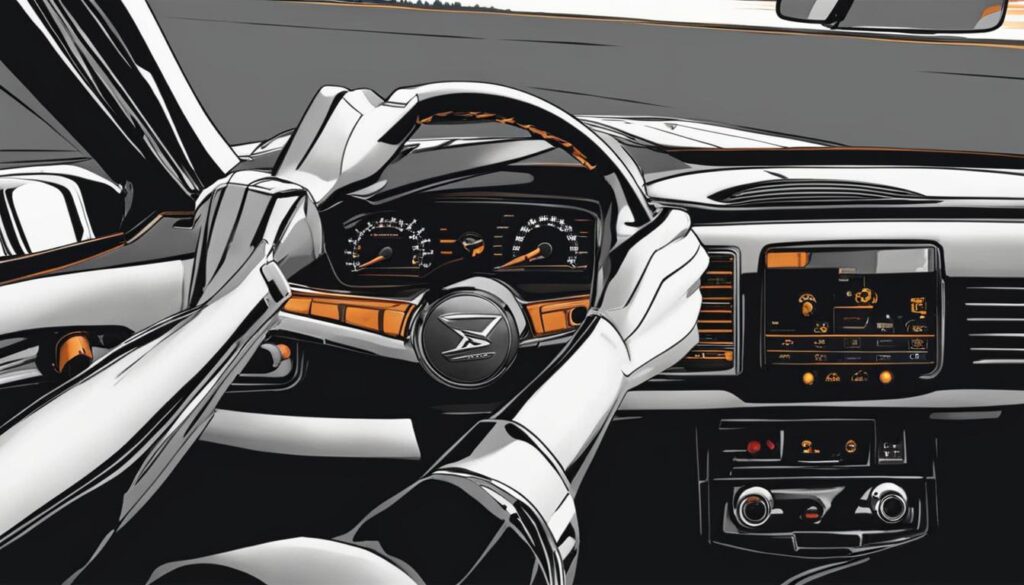Have you ever experienced the unsettling sensation of driving with a shaky steering wheel? Not only is it uncomfortable, but it can also be an indication of underlying mechanical issues. Steering wheel vibrations can occur for various reasons, affecting your overall driving experience and safety on the road.
Common causes of steering wheel vibration include brake rotor issues, misalignment, wheel bearing problems, brake caliper complications, axle troubles, wheel balance inconsistencies, and suspension issues. These factors can lead to a shaky steering wheel, making it crucial to identify and resolve them promptly.
Key Takeaways:
- Steering wheel vibrations can be caused by brake rotor issues, misalignment, wheel bearing problems, brake caliper complications, axle troubles, wheel balance inconsistencies, and suspension issues.
- Brake rotor warping can result in vibrations when braking.
- Misalignment of the wheels, often due to road hazards, can cause shaky steering wheels.
- Failing wheel bearings can also lead to vibrations and shaking.
- Sticky brake calipers can contribute to uneven braking and vibrations.
Causes and Fixes for Steering Wheel Vibration
Experiencing steering wheel vibration while driving can be a disconcerting and potentially dangerous situation. Understanding the causes of this issue and knowing how to fix steering wheel vibration is essential for a smooth and safe driving experience.
1. Unbalanced Wheels: One of the most common causes of steering wheel vibration, especially at high speeds, is unbalanced wheels. Over time, the distribution of weight on the wheels can become uneven, resulting in vibrations. Routine wheel balancing can correct this issue and restore a smooth ride.
2. Incorrect Wheel Alignment: Misalignment of the wheels is another frequent culprit behind steering wheel vibrations. Factors like hitting potholes or curbs can knock the wheels out of proper alignment. Fortunately, a simple wheel alignment can rectify this problem and eliminate the vibrations.
3. Damaged or Worn Wheel Bearings: Wheel bearings that are damaged or worn can lead to vibrations, particularly when turning. If you notice vibrations specifically when making turns, it may be necessary to replace the wheel bearings.
4. Worn Steering or Suspension Parts: Worn-out steering or suspension components can introduce slack into the system, resulting in steering wheel vibration. Regular inspection and maintenance can help identify and replace any worn parts, restoring smooth and stable steering.
5. Brake Problems: Brake-related issues, such as worn brake rotors or loose wheel bearings, can cause steering wheel vibrations when braking. Addressing these problems promptly is crucial to ensure proper braking performance and eliminate vibration concerns.
6. Suspension Issues: Problems with the suspension, including worn or loose components, can lead to a shaky steering wheel, especially at highway speeds. Proper diagnosis and repair of suspension issues are necessary to resolve steering wheel vibrations.
By addressing these common causes and utilizing appropriate fixes, you can effectively eliminate steering wheel vibration and enjoy a smooth and comfortable driving experience.
Steering Wheel Vibration: Signs and Symptoms
When it comes to steering wheel vibration, it’s important to be aware of the signs and symptoms that may indicate underlying issues with your vehicle. Driving with a vibrating steering wheel is not normal and can be a cause for concern. Here are some common signs to watch out for:
- Shaking while driving or braking: One of the most noticeable signs of steering wheel vibration is a shaking sensation that occurs while you’re driving or when you apply the brakes. This can be a clear indication of a problem with your vehicle’s steering system.
- Vibrations at high speeds: If you experience steering wheel vibration primarily at high speeds, it may be a result of unbalanced wheels. Uneven weight distribution on your tires can lead to vibrations that intensify as you drive faster.
- Pulling to one side: When your steering wheel pulls to one side while driving, it could be a sign of wheel misalignment. Misaligned wheels can cause your vehicle to veer off course and result in steering wheel vibrations.
- Shaking when turning: Wheel bearings play a crucial role in vehicle stability, and worn or damaged bearings can cause vibrations, especially when turning corners. If you notice shaking during turns, it’s important to have your wheel bearings inspected.
- Vibrations while braking: Brake problems, such as worn brake rotors or loose wheel bearings, can lead to steering wheel vibrations when you apply the brakes. If you experience this symptom, it’s essential to have your brakes checked and repaired promptly.
- Vibrations at high speeds: Steering wheel vibrations that occur primarily at higher speeds can also be attributed to suspension issues. Worn or damaged suspension components can cause your vehicle to feel unstable and result in shaking.
Being aware of these signs and symptoms is crucial for identifying steering wheel vibration issues early on. Addressing these problems promptly can help prevent further damage to your vehicle and ensure your safety on the road.

| Common Signs of Steering Wheel Vibration | Possible Causes |
|---|---|
| Shaking while driving or braking | Issues with the steering system, brake rotors, alignment, or suspension |
| Vibrations at high speeds | Unbalanced wheels or suspension problems |
| Pulling to one side | Wheel misalignment |
| Shaking when turning | Worn or damaged wheel bearings |
| Vibrations while braking | Brake problems or loose wheel bearings |
| Vibrations at high speeds | Suspension issues |
Conclusion
Steering wheel vibration can be an unsettling experience while driving, but luckily, there are ways to diagnose and fix the issue. Common causes of steering wheel vibration can include unbalanced wheels, misalignment, worn wheel bearings, brake problems, and suspension issues.
Addressing steering wheel vibrations promptly is crucial for both safety and preventing further damage to the vehicle. One effective solution is routine wheel balancing to correct any wheel imbalances. Additionally, a simple wheel alignment can solve steering wheel vibrations caused by misaligned wheels.
If the vibration is due to damaged or worn wheel bearings, it’s important to replace them to restore a smooth and steady ride. Brake problems, such as worn rotors or loose wheel bearings, should be promptly repaired to eliminate vibrations while braking. Suspension issues can also contribute to a shaky steering wheel, especially at higher speeds, so it’s essential to address any worn or loose components.
To prevent future steering wheel vibration problems, regular maintenance and inspections are key. By keeping up with these practices, you can identify and address any potential issues before they worsen. Consulting with a qualified mechanic is always recommended for accurate diagnosis and effective repairs, ensuring your steering wheel remains vibration-free and your driving experience remains smooth and safe.
FAQ
What are the common causes of steering wheel vibration?
Common causes of steering wheel vibration include issues with brake rotors, alignment, wheel bearings, brake calipers, axles, wheel balance, and suspension.
Why does the steering wheel vibrate while driving?
Steering wheel vibration while driving can be caused by unbalanced wheels, misalignment, wheel bearings, brake problems, or suspension issues.
Why does the steering wheel vibrate at high speeds?
Steering wheel vibration at high speeds can be caused by wheel balance issues, misalignment, or suspension problems.
What causes steering wheel vibration when braking?
Steering wheel vibration when braking can be caused by issues with brake rotors, wheel bearings, or loose suspension components.
Can hitting a pothole cause steering wheel vibration?
Yes, hitting a pothole can cause steering wheel vibration by damaging the wheels, suspension, or alignment of the vehicle.
How can I diagnose the cause of steering wheel vibration?
Consulting with a mechanic is recommended for an accurate diagnosis of steering wheel vibration. They can perform inspections and tests to identify the underlying issue.
How can I fix steering wheel vibration?
The solution for steering wheel vibration depends on the underlying cause. It may involve wheel balancing, alignment adjustment, replacing damaged components, or addressing suspension issues. A mechanic can provide the necessary repairs.




